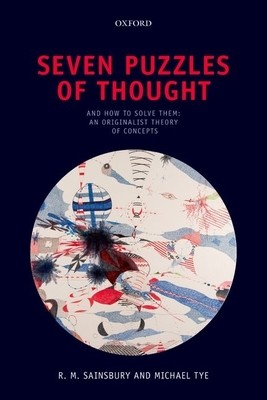
- We will send in 10–14 business days.
- Author: R M Sainsbury
- Publisher: Oxford University Press, USA
- ISBN-10: 019968894X
- ISBN-13: 9780199688944
- Format: 15.5 x 23.4 x 2 cm, softcover
- Language: English
- SAVE -10% with code: EXTRA
Reviews
Description
How can one think about the same thing twice without knowing that it's the same thing? How can one think about nothing at all (for example Pegasus, the mythical flying horse)? Is thinking about oneself special? One could mistake one's car for someone else's, but it seems one could not mistake one's own headache for someone else's. Why not?
Mark Sainsbury and Michael Tye provide an entirely new theory--called "originalism"-- which provides simple and natural solutions to these puzzles and more. Originalism's central thesis is that concepts, the constituents of thoughts, are to be individuated by their origin, rather than epistemically or semantically. The doctrine has further valuable consequences for the nature of thought, our knowledge of our own thoughts, the nature of experience, the epistemology of perception-based beliefs, and for arguments based on conceivability. Sainsbury and Tye argue that although thought is special, there is no special mystery attaching to the nature of thought. Their account of the mind considers it as part of nature, as opposed to something with supernatural powers--which means that human beings have more opportunities to make mistakes than many have liked to think.EXTRA 10 % discount with code: EXTRA
The promotion ends in 17d.19:29:08
The discount code is valid when purchasing from 10 €. Discounts do not stack.
- Author: R M Sainsbury
- Publisher: Oxford University Press, USA
- ISBN-10: 019968894X
- ISBN-13: 9780199688944
- Format: 15.5 x 23.4 x 2 cm, softcover
- Language: English English
How can one think about the same thing twice without knowing that it's the same thing? How can one think about nothing at all (for example Pegasus, the mythical flying horse)? Is thinking about oneself special? One could mistake one's car for someone else's, but it seems one could not mistake one's own headache for someone else's. Why not?
Mark Sainsbury and Michael Tye provide an entirely new theory--called "originalism"-- which provides simple and natural solutions to these puzzles and more. Originalism's central thesis is that concepts, the constituents of thoughts, are to be individuated by their origin, rather than epistemically or semantically. The doctrine has further valuable consequences for the nature of thought, our knowledge of our own thoughts, the nature of experience, the epistemology of perception-based beliefs, and for arguments based on conceivability. Sainsbury and Tye argue that although thought is special, there is no special mystery attaching to the nature of thought. Their account of the mind considers it as part of nature, as opposed to something with supernatural powers--which means that human beings have more opportunities to make mistakes than many have liked to think.

Reviews